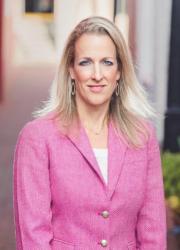Michael Pakaluk, a Harvard-trained philosopher and professor of political economy at the Catholic University’s Busch School of Business, has written a new book, Be Good Bankers: The Economic Interpretation of Matthew’s Gospel with a Fresh Translation. In it he argues that we should emulate bankers, a profession often viewed with malicious disdain, so that we can understand and fulfill God’s desires. While Pakaluk’s perspective is Catholic, Be Good Bankers nevertheless offers a fresh and vital ecumenical and exegetical understanding of Scripture, with practical applications for daily living and wise stewardship.
Professor Pakaluk asks us to suppose that Matthew’s Gospel was “written according to express instructions given by Jesus” and that Jesus’s choice of Matthew, the tax collector, was intentional. This background, he suggests, enabled Matthew to explore and reveal the teachings of Jesus in a unique manner, one that can inform our approach to both our commercial work and personal relationships.
Pakaluk traces the history of the phrase “Be ye good bankers,” an agrapha, or unwritten saying attributed to Jesus, back to the early-fifth-century monk John Cassian, though it made a first impression upon him in graduate school while reading Saint Francis de Sales, who references it in his Introduction to the Devout Life when speaking of human friendship. To “be a good banker” is to “receive not bad money with the good, nor base gold with the fine,” which is to say, we should choose our friends with the knowledge that the sins of another impact us and that we should “separate that which is precious from that which is vile; for there is scarcely any person that has not some imperfection.”
Being good bankers does not mean only that we maintain accurate accounting ledgers or that we treat people honestly, separate the real (the good) from the counterfeit (the bad), and conduct our commercial exchanges with integrity (although this is a given). The book argues that this maxim, which can be found in the spirit of the Gospel through the eyewitness account of Matthew, commands that we reconcile our work in the world with God’s divine economy. Our work today has eternal significance, even though we will not fully appreciate or understand the implications and rewards until we are united with Christ.
~~~
Pakaluk begins with a biblical worldview and three anthropological preconditions. We are “designed’ to engage in business and earn a living. God knows this (because He created us) and uses it for His purposes, which is to teach us about Himself. This is why there are essential analogies between the spiritual life and the world of business.
We are, of course, made to work in both paid and unpaid capacities, but the eternal and spiritual significance of our paid labor is often overlooked. We are also finite, fallen, and limited in our abilities and knowledge, and we need community. Rather than rugged individualists, we are interdependent and created to need and work with one another. Adam Smith, a moral philosopher who has lasting significance as one of the world’s preeminent economists, is referenced early in the book. Smith acknowledged and worried about our predilections for the crude and vain. He also understood that our capacities for productive work are quite limited as lone individuals. The division of labor, which yields specialization and productivity gains, cannot be obtained without cooperation. Even Robinson Crusoe had Friday; being alone is the inauspicious sign of our demise.
Pakaluk goes on to argue that business relationships often form a sort of friendship, as they involve long-term relationships focused on value creation. Market commerce, driven by business activity, is positive-sum—we create wealth together through mutually beneficial and voluntary exchanges. Moreover, business creates a “concrete language” for God to speak to us about Himself.
This exegetical exercise requires that we consider the relationship between the spiritual lessons of Matthew and the economic way of thinking. Economics is the study of human behavior under conditions of scarcity and uncertainty. Thus, economics, oikonomia, at the micro level is about stewardship, which relates to the management and investment of our resources—our time, treasure, and talents. At the macro level, oikonomia regards God’s plan for salvation and the prudent application of His truth in the world. At both the micro and macro levels, human beings are the subject matter. This makes economics distinct from other hard sciences, such as biology, physics, and chemistry, which focus on the physical world of matter, movement, and cells. Economics requires that we begin with the immutable truths of human nature.
Our anthropological understanding of man comes from Scripture. We are made in the image and likeness of God, and thus have purpose. We are created to be creators, to live in community, and to serve the common good through our unique gifts and talents. As Pakaluk tells it, Jesus calls Matthew to be one of His followers, not despite the fact that he was a tax collector, but because of it. Matthew would have been familiar with Roman accounting and record-keeping practices related to household debts and obligations. Pakaluk writes:
Jesus himself was a carpenter and handyman. His four chief Apostles were fishermen. But he deliberately called a tax collector to be an Apostle also. A tax collector spent his time valuing transactions and entities in light of the relevant laws and making careful records of the same. Was it just an accident that Jesus called a person like that, or was it that Matthew’s background matched this mode of presenting the gospel?
Pakaluk answers yes to the latter question. And isn’t it just like Jesus to use a profession loathed by so many to offer insights into how to further our relationship with Christ?
~~~
We can and should work both commercially and philanthropically to serve one another. In a market economy that relies on private property rights, this requires sound banking practices. This means “we are all bankers now,” which plays off President Nixon’s 1971 declaration that “we are all Keynesians now,” the notion that a wise and well-intentioned government can make surgical interventions to steer the economy toward growth and productivity. “We are all bankers now” challenges the Keynesian notion significantly, however, because the banking that Matthew is talking about is decentralized—it is about relationships between people and the best rules that should govern (small g) human exchanges and interactions.
For example, a good banker possesses the following qualities: honesty, integrity, trustworthiness, transparency, responsibility, and thoroughness. You deposit your earned money with the banker, who then has a fiduciary responsibility to make investments that aid both you and the bank. Banking practices must align the incentives between the individual and the bank to ensure mutual benefits. This requires good, nonnegotiable accounting practices and honest dealings that can also teach us how to live well and please God.
This is best illustrated by Pakaluk’s exegetical work. He argues that Matthew is uniquely poised by virtue of his vocation to use economic language and analogies to convey the Christian message in three significant ways. First, the structure of Matthew, which is divided into two parts, is analogous to a ledger recording a deposit (the Incarnation) and a payment (Jesus’s sacrifice), which is credited to another account (our own): the divine economy that enables those who cannot pay a debt to nevertheless find peace. The result of this transaction is a “new household”—the Kingdom of Heaven.
Second, we can see that the economic way of thinking permeates the gospel and the teachings of Jesus. Pakaluk references the work of Rev. Robert Sirico, who has written a book dedicated to the economic way of thinking as exposited in the parables. Third, the language of Matthew reveals details that provide insight into Matthew as an evangelist. The author claims that there is “cash value” for Christians and business owners to take from the book.
The Christian life must mimic the skills and traits of a good banker—in our family, community, and business relationships. We are to steward well what God has given us and use our resources to make contributions to the common good. Being good bankers means we act with prudence, justice, temperance, and, yes, even charity. Being a good banker, as explicated by Pakaluk following in the footsteps of St. Francis, demolishes the sacred-secular divide, enabling us to better discern God’s will for our life and relationships (both work and personal)—and thus fulfill His mandate for shalom, peace.
I would urge any reader to begin by reading the book of Matthew and only then Be Good Bankers. Then reread Matthew. There is much for all of us nonbankers to learn about being good bankers by employing the characteristics of honesty, justice, integrity, precise accounting, debt fulfillment, and value creation. God gave each of us gifts so we can share them with others. The market economy provides one avenue for us to do this. Being good bankers means adopting wisdom in both our personal relationships and commercial dealings so that we can create value for society and go beyond temporal wealth by fulfilling God’s commandments.

